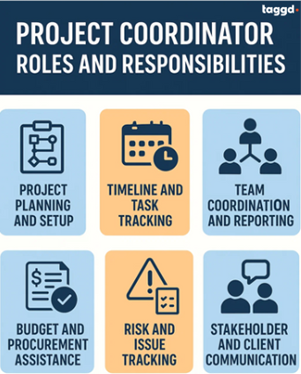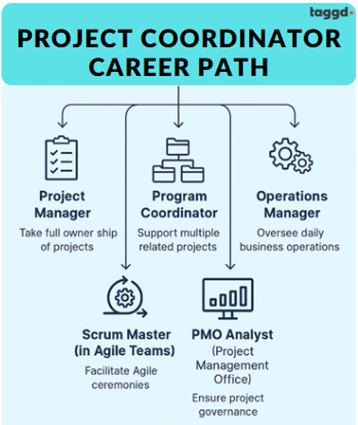Project Coordinator Roles and Responsibilities: Behind every milestone hit and deadline met is a skilled Project Coordinator making sure nothing falls through the cracks. In 2025, as projects grow more complex, this role has become indispensable. Here’s everything you need to know.
A Project Coordinator plays a key supporting role in project management, ensuring smooth execution of projects by managing logistics, communication, documentation, and coordination across teams. This role is essential in keeping projects on track, on budget, and within scope.
In 2025, this role has become more important than ever. As companies handle multiple projects across departments, the need for someone who can organize, communicate, and manage the details has grown sharply.
This blog will walk you through what a Project Coordinator does, the key skills needed for the role, daily responsibilities, and how it compares to a Project Manager. Whether you’re hiring for this position or planning to step into it, this guide has you covered.
Who is a Project Coordinator?
A Project Coordinator is a key team member responsible for keeping a project’s moving parts aligned and running smoothly. They support project managers by handling day-to-day coordination, ensuring communication between stakeholders, tracking progress, managing documentation, and resolving scheduling or logistical issues.
Think of them as the central hub that connects team members, vendors, and leadership—ensuring that no task falls through the cracks.
The daily roles and responsibilities of a Project Coordinator includes-
- Scheduling meetings and tracking timelines
- Updating project plans and reports
- Coordinating between different departments
- Managing documentation and approvals
- Identifying and reporting issues or delays
For example, in a construction project, a Project Coordinator might track subcontractor schedules, ensure safety documentation is updated, and follow up on material deliveries.
In an IT project, they might manage sprint progress on Jira, organize team stand-ups, and prepare client-facing status reports.
According to Glassdoor, the average project coordinator salary in India 2025 is INR 4 to 7 LPA, while in the U.S., it’s around USD 55,000– 65,000/year. Salaries increase with specialization in tech, healthcare, or engineering industries.
What Does a Project Coordinator Do?
A Project Coordinator plays a vital role in ensuring smooth project execution by managing tasks, tracking timelines, and supporting communication across teams. Whether in IT, construction, marketing, or healthcare, they help keep every element of a project aligned and on schedule.

Here are the key responsibilities and duties of a Project Coordinator in today’s dynamic work environment:
1. Project Planning and Setup
- Assist in defining project scope, goals, and deliverables.
- Help create detailed project plans, Gantt charts, and work breakdown structures (WBS).
- Identify resource needs and help allocate tasks.
Project Coordinators lay the foundation for successful execution by translating ideas into structured plans. Their involvement in project planning ensures alignment with business goals from the start.
2. Timeline and Task Tracking
- Monitor project schedules and update timelines.
- Coordinate task completion among different teams.
- Flag delays and bottlenecks to the project manager.
Tracking tasks and deadlines is crucial to avoid project overruns. Project coordinators implement GRPI Models under the Project Manager’s guidance and use tools like MS Project, Jira, or Trello to monitor progress in real-time and keep things on schedule.
3. Team Coordination
- Serve as the communication hub between cross-functional teams.
- Schedule and organize team meetings, stand-ups, and client reviews.
- Ensure team members have the resources and information they need.
Effective team coordination prevents miscommunication. Project Coordinators streamline collaboration between departments, vendors, and clients, ensuring everyone is aligned.
4. Documentation and Reporting
- Maintain comprehensive documentation: project charters, meeting minutes, reports.
- Prepare status updates and project dashboards for stakeholders.
- Ensure compliance with documentation standards.
From kickoff to closure, documentation is key to transparency. Coordinators manage all project records to support audits, reporting, and knowledge sharing.
5. Budget and Procurement Assistance
- Track project spending and help manage budgets.
- Process purchase orders, invoices, and vendor contracts.
- Alert the PM to budget risks or overspending.
Though not fully responsible for finances, Project Coordinators assist in budget tracking and procurement processes, helping ensure the project stays within financial limits.
6. Risk and Issue Tracking
- Maintain a log of project risks, assumptions, issues, and dependencies (RAID log).
- Coordinate with stakeholders to implement mitigation plans.
- Escalate critical issues to the project manager or leadership.
Coordinators play a proactive role in risk management. By keeping a detailed RAID log, they help prevent potential disruptions and maintain project stability.
7. Stakeholder and Client Communication
- Respond to queries and share regular updates with stakeholders.
- Ensure client requirements are clearly communicated to the team.
- Prepare presentations and reports for client meetings.
Coordinators bridge internal teams and external stakeholders. Their communication ensures clarity, builds trust, and keeps everyone aligned on expectations.
Key Skills Required for Project Coordinators
According to a 2024 PMI (Project Management Institute) report, 70% of project failures are linked to poor communication and lack of coordination, highlighting the increasing demand for skilled Project Coordinators with strong organizational, technical, and interpersonal abilities.
In 2025’s fast-paced, tech-enabled project environments, simply checking boxes isn’t enough. A successful Project Coordinator must balance structure with agility, strategy with execution, and communication with action.
Here are the top project coordinator skills employers are looking for:
| Skill | Why It Matters in Project Coordination |
| Organizational Skills | Project Coordinators handle multiple tasks, timelines, and stakeholders. Strong organizational skills ensure everything stays on track and nothing slips through the cracks. |
| Communication | Clear and timely communication, both written and verbal is essential for managing expectations, coordinating across teams, and reporting to clients or leadership. |
| Problem-solving | Projects rarely go 100% as planned. Coordinators must identify potential roadblocks early and propose solutions that keep the project moving forward. |
| Tech-savviness | Proficiency in project management tools like Asana, Trello, Jira, and MS Project helps coordinators streamline workflows, track KPIs, and collaborate efficiently. |
| Attention to Detail | From reviewing contracts to updating schedules, the ability to spot errors or inconsistencies can prevent major project risks down the line. |
Employers increasingly look for behavioral competencies and cross-functional skills like data literacy, basic financial understanding, and familiarity with Agile or Scrum frameworks. These add extra value to your project coordination profile.
Project Coordinator Job Description Template [2025]
Hiring the right Project Coordinator can make the difference between project success and failure. This role is crucial for ensuring smooth collaboration, timely execution, and alignment across teams.
If you’re an employer looking to hire or a candidate trying to understand the job better, use this updated Project Coordinator job description template as a reference. It reflects the real-world expectations of 2025’s fast-paced and tech-driven project environments.
Job Title: Project Coordinator
Location: [City, State] / Hybrid / Remote
Job Type: Full-time
Job Overview
We are seeking a motivated and detail-oriented Project Coordinator to support our project management team. In this role, you will help plan, organize, and oversee project activities from initiation through delivery. You’ll work closely with internal departments, external vendors, and key stakeholders to keep timelines on track, ensure clear communication, and maintain up-to-date documentation.
This role is ideal for candidates who are proactive, organized, and comfortable working in dynamic, cross-functional teams.
Key Responsibilities
- Coordinate internal resources and third-party vendors to execute projects.
- Maintain comprehensive project documentation and update progress reports regularly.
- Track project timelines, milestones, and deliverables to ensure on-time completion.
- Assist in preparing project plans, status updates, and team meeting agendas.
- Act as the communication bridge between teams, stakeholders, and clients.
- Identify risks and escalate issues to project managers as needed.
- Support in tracking project budgets and processing vendor-related paperwork.
Requirements
- Bachelor’s degree in Business Administration, Project Management, Communications, or a related field.
- 1–3 years of experience in project coordination, project support, or administrative roles.
- Proficiency with project management software (e.g., MS Project, Trello, Asana, Jira).
- Excellent organizational, time management, and multitasking abilities.
- Strong written and verbal communication skills.
- Ability to adapt to changing priorities and work well under pressure.
Bonus Skills (Preferred)
- Basic understanding of Agile or Scrum methodologies.
- Experience with project budgeting or procurement processes.
- Familiarity with data analysis or reporting tools (e.g., Excel, Power BI, Notion).
Who Should Apply?
This role suits professionals looking to step into a project management career path, especially in industries like IT, marketing, construction, or healthcare. If you enjoy structure, collaboration, and getting things done efficiently, this position offers an excellent foundation for future growth.
Project Coordinator vs. Project Manager: Key Differences Explained
When it comes to project management roles, the terms Project Coordinator and Project Manager are often used interchangeably, but they represent two distinct levels of responsibility within a project team.
Understanding the difference is crucial whether you’re a job seeker planning your career path or an employer defining your hiring needs. While Project coordinator and Project Manager roles and responsibilities include driving project success, their focus, decision-making power, and leadership responsibilities vary significantly.
Here’s a quick project coordinator vs project manager difference-
| Feature | Project Coordinator | Project Manager |
| Focus | Execution, coordination, and task tracking | Strategic planning, project ownership, and outcome delivery |
| Decision-making | Limited to daily operations and task-level issues | Makes high-level decisions affecting scope, budget, and risk |
| Client Interaction | Occasional updates or support during meetings | Regular, direct communication with clients and stakeholders |
| Reporting to | Reports to the Project Manager | Reports to senior management, clients, or the PMO |
| Leadership | Minimal or no direct leadership responsibilities | Leads project team, assigns responsibilities, ensures delivery |
Who Should Pursue Which Role?
- Aspiring Project Managers often begin their careers as Project Coordinators to build foundational skills in communication, scheduling, and stakeholder coordination.
- If you enjoy planning and oversight, and are ready for decision-making authority, the Project Manager role offers greater leadership and career advancement opportunities.
Career Path: Where Can a Project Coordinator Go Next?
A Project Coordinator role is an excellent stepping stone in the project management career ladder. With the right experience, certifications, and soft skills, professionals in this position can progress into more strategic and leadership-oriented roles.
Here are the top career paths after being a Project Coordinator, along with how each role builds on your existing skill set:

Project Manager
The most natural next step, a Project Manager takes full ownership of projects from planning and budgeting to stakeholder communication and delivery. As a Project Coordinator, you’ve already mastered task tracking and coordination. With added experience and certifications like PMP or PRINCE2, you’re ready to lead.
Program Coordinator
While a Project Coordinator focuses on a single project, a Program Coordinator supports multiple related projects under one program. This role expands your visibility across departments and helps you understand broader organizational goals and interdependencies.
Operations Manager
If you enjoy process improvement, cross-functional alignment, and daily business operations, transitioning into an Operations Manager role can be a smart move. This position leverages your planning and organizational skills on a larger business scale.
Scrum Master (in Agile Teams)
For those in tech or product development environments, becoming a Scrum Master is a strong career progression. With Agile certification (like CSM), Project Coordinators can transition into facilitating Agile ceremonies, removing team blockers, and improving workflows in iterative project settings.
PMO Analyst (Project Management Office)
PMO roles and responsibilities include work within a centralized project management office to ensure project governance, standards, and best practices. If you’re detail-oriented and love reporting and process optimization, this is a data-driven path ideal for you.
Final Tip
To grow from a Project Coordinator role, consider earning industry-recognized certifications such as:
- PMP (Project Management Professional)
- CAPM (Certified Associate in Project Management)
- Agile Certified Practitioner (PMI-ACP)
These credentials, along with on-the-job experience, can fast-track your transition to leadership roles in project and program management.
Wrapping Up
Project Coordinators are the silent drivers of project success, keeping timelines intact, teams aligned, and tasks on track. Their ability to manage logistics, streamline communication, and support project delivery makes them an invaluable asset across industries.
Whether you’re looking to start a career in project management or hire a capable coordinator for your team, understanding the full scope of this role is the first step toward project excellence. As businesses continue to manage complex, fast-paced projects in 2025 and beyond, skilled project coordinators will remain in high demand.
Project Coordinator Roles and Responsibilities: Behind every milestone hit and deadline met is a skilled Project Coordinator making sure nothing falls through the cracks. In 2025, as projects grow more complex, this role has become indispensable. Here’s everything you need to know.
A Project Coordinator plays a key supporting role in project management, ensuring smooth execution of projects by managing logistics, communication, documentation, and coordination across teams. This role is essential in keeping projects on track, on budget, and within scope.
In 2025, this role has become more important than ever. As companies handle multiple projects across departments, the need for someone who can organize, communicate, and manage the details has grown sharply.
This blog will walk you through what a Project Coordinator does, the key skills needed for the role, daily responsibilities, and how it compares to a Project Manager. Whether you’re hiring for this position or planning to step into it, this guide has you covered.
Who is a Project Coordinator?
A Project Coordinator is a key team member responsible for keeping a project’s moving parts aligned and running smoothly. They support project managers by handling day-to-day coordination, ensuring communication between stakeholders, tracking progress, managing documentation, and resolving scheduling or logistical issues.
Think of them as the central hub that connects team members, vendors, and leadership—ensuring that no task falls through the cracks.
The daily roles and responsibilities of a Project Coordinator includes-
- Scheduling meetings and tracking timelines
- Updating project plans and reports
- Coordinating between different departments
- Managing documentation and approvals
- Identifying and reporting issues or delays
For example, in a construction project, a Project Coordinator might track subcontractor schedules, ensure safety documentation is updated, and follow up on material deliveries.
In an IT project, they might manage sprint progress on Jira, organize team stand-ups, and prepare client-facing status reports.
According to Glassdoor, the average project coordinator salary in India 2025 is INR 4 to 7 LPA, while in the U.S., it’s around USD 55,000– 65,000/year. Salaries increase with specialization in tech, healthcare, or engineering industries.
What Does a Project Coordinator Do?
A Project Coordinator plays a vital role in ensuring smooth project execution by managing tasks, tracking timelines, and supporting communication across teams. Whether in IT, construction, marketing, or healthcare, they help keep every element of a project aligned and on schedule.

Here are the key responsibilities and duties of a Project Coordinator in today’s dynamic work environment:
1. Project Planning and Setup
- Assist in defining project scope, goals, and deliverables.
- Help create detailed project plans, Gantt charts, and work breakdown structures (WBS).
- Identify resource needs and help allocate tasks.
Project Coordinators lay the foundation for successful execution by translating ideas into structured plans. Their involvement in project planning ensures alignment with business goals from the start.
2. Timeline and Task Tracking
- Monitor project schedules and update timelines.
- Coordinate task completion among different teams.
- Flag delays and bottlenecks to the project manager.
Tracking tasks and deadlines is crucial to avoid project overruns. Project coordinators implement GRPI Models under the Project Manager’s guidance and use tools like MS Project, Jira, or Trello to monitor progress in real-time and keep things on schedule.
3. Team Coordination
- Serve as the communication hub between cross-functional teams.
- Schedule and organize team meetings, stand-ups, and client reviews.
- Ensure team members have the resources and information they need.
Effective team coordination prevents miscommunication. Project Coordinators streamline collaboration between departments, vendors, and clients, ensuring everyone is aligned.
4. Documentation and Reporting
- Maintain comprehensive documentation: project charters, meeting minutes, reports.
- Prepare status updates and project dashboards for stakeholders.
- Ensure compliance with documentation standards.
From kickoff to closure, documentation is key to transparency. Coordinators manage all project records to support audits, reporting, and knowledge sharing.
5. Budget and Procurement Assistance
- Track project spending and help manage budgets.
- Process purchase orders, invoices, and vendor contracts.
- Alert the PM to budget risks or overspending.
Though not fully responsible for finances, Project Coordinators assist in budget tracking and procurement processes, helping ensure the project stays within financial limits.
6. Risk and Issue Tracking
- Maintain a log of project risks, assumptions, issues, and dependencies (RAID log).
- Coordinate with stakeholders to implement mitigation plans.
- Escalate critical issues to the project manager or leadership.
Coordinators play a proactive role in risk management. By keeping a detailed RAID log, they help prevent potential disruptions and maintain project stability.
7. Stakeholder and Client Communication
- Respond to queries and share regular updates with stakeholders.
- Ensure client requirements are clearly communicated to the team.
- Prepare presentations and reports for client meetings.
Coordinators bridge internal teams and external stakeholders. Their communication ensures clarity, builds trust, and keeps everyone aligned on expectations.
Key Skills Required for Project Coordinators
According to a 2024 PMI (Project Management Institute) report, 70% of project failures are linked to poor communication and lack of coordination, highlighting the increasing demand for skilled Project Coordinators with strong organizational, technical, and interpersonal abilities.
In 2025’s fast-paced, tech-enabled project environments, simply checking boxes isn’t enough. A successful Project Coordinator must balance structure with agility, strategy with execution, and communication with action.
Here are the top project coordinator skills employers are looking for:
| Skill | Why It Matters in Project Coordination |
| Organizational Skills | Project Coordinators handle multiple tasks, timelines, and stakeholders. Strong organizational skills ensure everything stays on track and nothing slips through the cracks. |
| Communication | Clear and timely communication, both written and verbal is essential for managing expectations, coordinating across teams, and reporting to clients or leadership. |
| Problem-solving | Projects rarely go 100% as planned. Coordinators must identify potential roadblocks early and propose solutions that keep the project moving forward. |
| Tech-savviness | Proficiency in project management tools like Asana, Trello, Jira, and MS Project helps coordinators streamline workflows, track KPIs, and collaborate efficiently. |
| Attention to Detail | From reviewing contracts to updating schedules, the ability to spot errors or inconsistencies can prevent major project risks down the line. |
Employers increasingly look for behavioral competencies and cross-functional skills like data literacy, basic financial understanding, and familiarity with Agile or Scrum frameworks. These add extra value to your project coordination profile.
Project Coordinator Job Description Template [2025]
Hiring the right Project Coordinator can make the difference between project success and failure. This role is crucial for ensuring smooth collaboration, timely execution, and alignment across teams.
If you’re an employer looking to hire or a candidate trying to understand the job better, use this updated Project Coordinator job description template as a reference. It reflects the real-world expectations of 2025’s fast-paced and tech-driven project environments.
Job Title: Project Coordinator
Location: [City, State] / Hybrid / Remote
Job Type: Full-time
Job Overview
We are seeking a motivated and detail-oriented Project Coordinator to support our project management team. In this role, you will help plan, organize, and oversee project activities from initiation through delivery. You’ll work closely with internal departments, external vendors, and key stakeholders to keep timelines on track, ensure clear communication, and maintain up-to-date documentation.
This role is ideal for candidates who are proactive, organized, and comfortable working in dynamic, cross-functional teams.
Key Responsibilities
- Coordinate internal resources and third-party vendors to execute projects.
- Maintain comprehensive project documentation and update progress reports regularly.
- Track project timelines, milestones, and deliverables to ensure on-time completion.
- Assist in preparing project plans, status updates, and team meeting agendas.
- Act as the communication bridge between teams, stakeholders, and clients.
- Identify risks and escalate issues to project managers as needed.
- Support in tracking project budgets and processing vendor-related paperwork.
Requirements
- Bachelor’s degree in Business Administration, Project Management, Communications, or a related field.
- 1–3 years of experience in project coordination, project support, or administrative roles.
- Proficiency with project management software (e.g., MS Project, Trello, Asana, Jira).
- Excellent organizational, time management, and multitasking abilities.
- Strong written and verbal communication skills.
- Ability to adapt to changing priorities and work well under pressure.
Bonus Skills (Preferred)
- Basic understanding of Agile or Scrum methodologies.
- Experience with project budgeting or procurement processes.
- Familiarity with data analysis or reporting tools (e.g., Excel, Power BI, Notion).
Who Should Apply?
This role suits professionals looking to step into a project management career path, especially in industries like IT, marketing, construction, or healthcare. If you enjoy structure, collaboration, and getting things done efficiently, this position offers an excellent foundation for future growth.
Project Coordinator vs. Project Manager: Key Differences Explained
When it comes to project management roles, the terms Project Coordinator and Project Manager are often used interchangeably, but they represent two distinct levels of responsibility within a project team.
Understanding the difference is crucial whether you’re a job seeker planning your career path or an employer defining your hiring needs. While Project coordinator and Project Manager roles and responsibilities include driving project success, their focus, decision-making power, and leadership responsibilities vary significantly.
Here’s a quick project coordinator vs project manager difference-
| Feature | Project Coordinator | Project Manager |
| Focus | Execution, coordination, and task tracking | Strategic planning, project ownership, and outcome delivery |
| Decision-making | Limited to daily operations and task-level issues | Makes high-level decisions affecting scope, budget, and risk |
| Client Interaction | Occasional updates or support during meetings | Regular, direct communication with clients and stakeholders |
| Reporting to | Reports to the Project Manager | Reports to senior management, clients, or the PMO |
| Leadership | Minimal or no direct leadership responsibilities | Leads project team, assigns responsibilities, ensures delivery |
Who Should Pursue Which Role?
- Aspiring Project Managers often begin their careers as Project Coordinators to build foundational skills in communication, scheduling, and stakeholder coordination.
- If you enjoy planning and oversight, and are ready for decision-making authority, the Project Manager role offers greater leadership and career advancement opportunities.
Career Path: Where Can a Project Coordinator Go Next?
A Project Coordinator role is an excellent stepping stone in the project management career ladder. With the right experience, certifications, and soft skills, professionals in this position can progress into more strategic and leadership-oriented roles.
Here are the top career paths after being a Project Coordinator, along with how each role builds on your existing skill set:

Project Manager
The most natural next step, a Project Manager takes full ownership of projects from planning and budgeting to stakeholder communication and delivery. As a Project Coordinator, you’ve already mastered task tracking and coordination. With added experience and certifications like PMP or PRINCE2, you’re ready to lead.
Program Coordinator
While a Project Coordinator focuses on a single project, a Program Coordinator supports multiple related projects under one program. This role expands your visibility across departments and helps you understand broader organizational goals and interdependencies.
Operations Manager
If you enjoy process improvement, cross-functional alignment, and daily business operations, transitioning into an Operations Manager role can be a smart move. This position leverages your planning and organizational skills on a larger business scale.
Scrum Master (in Agile Teams)
For those in tech or product development environments, becoming a Scrum Master is a strong career progression. With Agile certification (like CSM), Project Coordinators can transition into facilitating Agile ceremonies, removing team blockers, and improving workflows in iterative project settings.
PMO Analyst (Project Management Office)
PMO roles and responsibilities include work within a centralized project management office to ensure project governance, standards, and best practices. If you’re detail-oriented and love reporting and process optimization, this is a data-driven path ideal for you.
Final Tip
To grow from a Project Coordinator role, consider earning industry-recognized certifications such as:
- PMP (Project Management Professional)
- CAPM (Certified Associate in Project Management)
- Agile Certified Practitioner (PMI-ACP)
These credentials, along with on-the-job experience, can fast-track your transition to leadership roles in project and program management.
Wrapping Up
Project Coordinators are the silent drivers of project success, keeping timelines intact, teams aligned, and tasks on track. Their ability to manage logistics, streamline communication, and support project delivery makes them an invaluable asset across industries.
Whether you’re looking to start a career in project management or hire a capable coordinator for your team, understanding the full scope of this role is the first step toward project excellence. As businesses continue to manage complex, fast-paced projects in 2025 and beyond, skilled project coordinators will remain in high demand.
Looking to Hire a Project Coordinator or Need End-to-End Hiring Support?
Need to Hire Project Coordinators Who Deliver Results?
RPO experts at Taggd connect you with skilled project coordinators vetted for speed, collaboration, and execution excellence.









